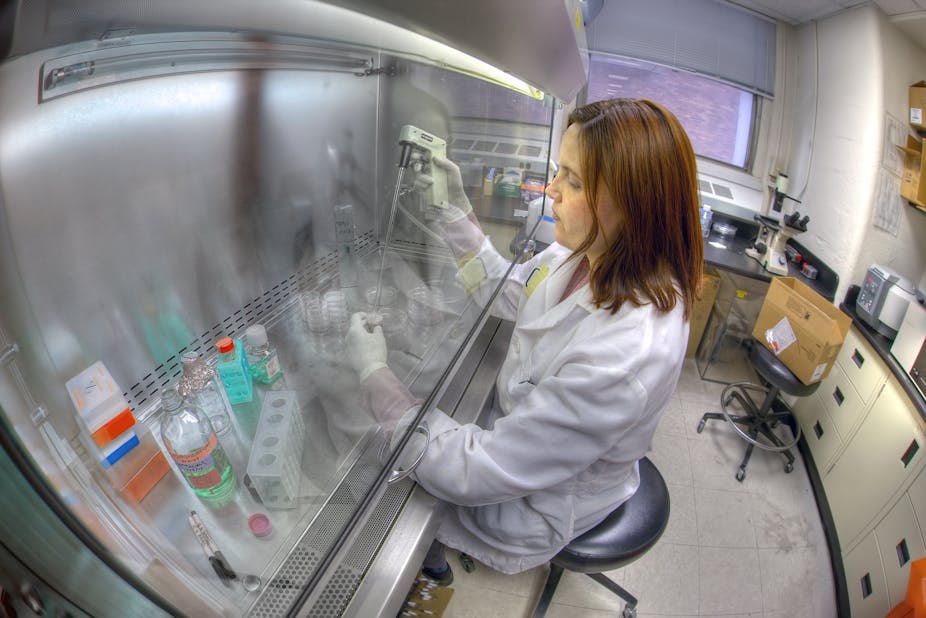MATHS AND SCIENCE EDUCATION: We’ve asked our authors about the state of maths and science education in Australia and its future direction. In this instalment, Marguerite Evans-Galea, Darren Saunders, and Krystal Evans look at ways we can improve the transition from research to teaching.
Ask a PhD student what attracted them into research and they’ll probably answer they wanted to make a difference. Ask a teacher what attracted them to the classroom and you will probably hear the same reply.
There is a general consensus that a good teacher is passionate, knowledgeable and engages students with relevant and interesting material. Inspirational teachers can have a big influence on what students study.
Increasingly high school students today are disengaged with science and the number of students enrolling in secondary science subjects is falling. Today, only half of our Year 12 students study a science subject; down from nine out of ten students in the early nineties.
Attracting science researchers into education, as proposed by the Australian Academy of Science, could be a win-win-win situation for the education sector, researchers and school students alike. More science teachers qualified in research will open a new career path beyond academia for PhD graduates and most importantly, give Australia’s students access to inspirational teachers who can share their research expertise.
Why encourage researchers to teach?
Every year Australia graduates more than 6,000 PhD-qualified researchers. In 2011, close to 4,000 PhDs were awarded in health, engineering, technology and the natural and physical sciences, with another 376 in education. There are also qualified research scientists without a PhD.
These young people and researchers are passionate about science and education. But the harsh reality of limited academic and industrial research opportunities in Australia means many are forced either to leave the country or work outside their chosen field or profession.
This represents a large pool of highly trained, motivated and passionate graduates. Encouraging PhD graduates into teaching careers could significantly benefit Australia. Having school science teachers with a PhD ensures they are not only passionate about science, but can also draw on their unique research expertise to engage students in “learning by doing” – an approach with demonstrated results.
Teachers with a research background will have a number of professional resources available to them. Taking students on tours of research facilities, accessing field sites or inviting experts for guest lectures could be arranged by a teacher with direct connections and experience in the research sector.
Better pathways for PhDs
A PhD provides a suite of transferable skills valuable in any profession. But PhD training in Australian universities needs to be diversified to include skills for careers outside of academia.
This could include partnerships with schools and secondments in education. Early identification of PhD students who wish to enter the education system would enable them to develop cross-sector skills and professional networks during their degree.
In attracting PhD graduates into teaching, considerations include a viable, long-term career path that is broadly recognised and well-supported. Ongoing intellectual challenges along with realistic incentives will be essential and may include recognising the PhD with remuneration and extended professional development opportunities.
PhD-qualified teachers would strongly benefit from maintaining strong ties to their previous academic or industry-based research. Mentoring programs which connect researchers and teachers at all levels could also be established.
Preparing for the future
Education in science and maths is essential to our future. Our citizens rely on science and technology to live healthy, productive lives. The government knows science is central to every aspect of our lives and uses scientific evidence to secure Australia’s future.
Just like scientists, children are naturally curious. We need inspirational teachers imparting real-world knowledge, understanding and respect for the scientific process.
As a nation member of the broader global community, how we manage food and water security, health and social wellbeing as our population grows, particularly in the context of climate change, will be of critical importance. To meet these challenges, we will need a scientifically literate community that can make well-informed decisions.
We must maintain a research workforce to drive discovery and invention, with rapid innovation of the latest technologies. This means ensuring students are encouraged to pursue a higher education in science to provide an enduring research workforce well into the future. Without effective science and maths education, this productive cycle may slow and could even grind to a halt.
We must inspire the scientists of tomorrow who are among our students of today. Researchers teaching science, mentored by experienced teachers, would help re-energise science education. Establishing initiatives to transition researchers from the lab bench to the classroom will require political leadership and resources, but will strengthen Australia’s position to tackle future national and global challenges.
This is the fifth part of our series Maths and Science Education.

